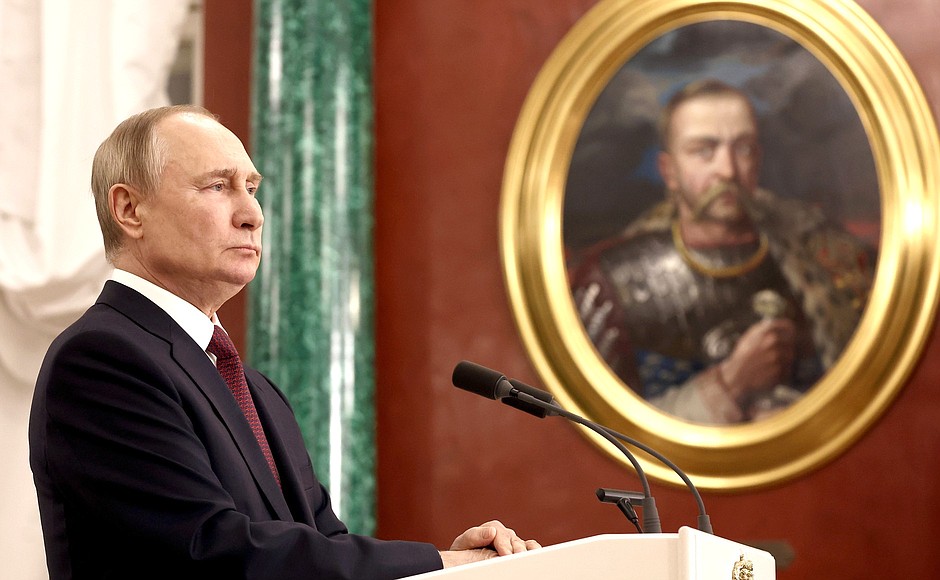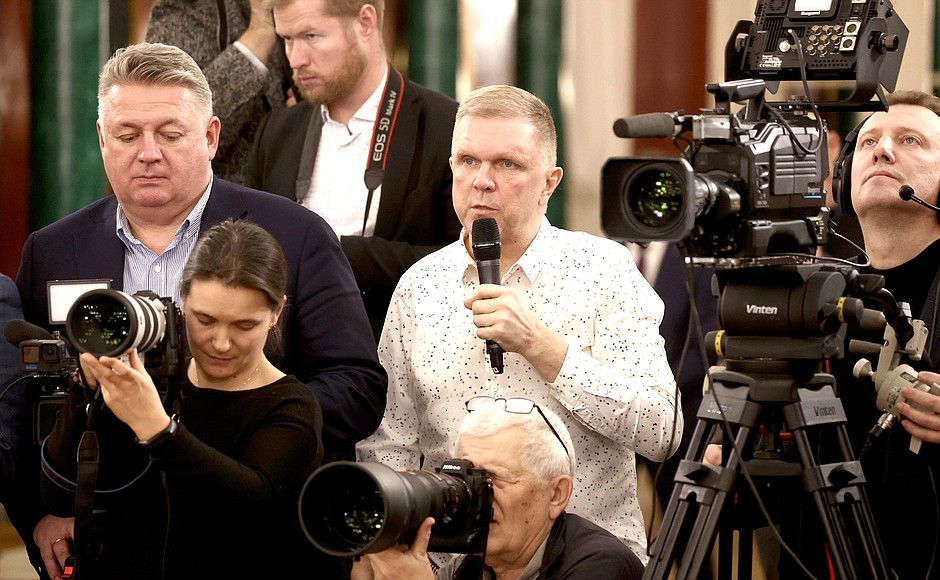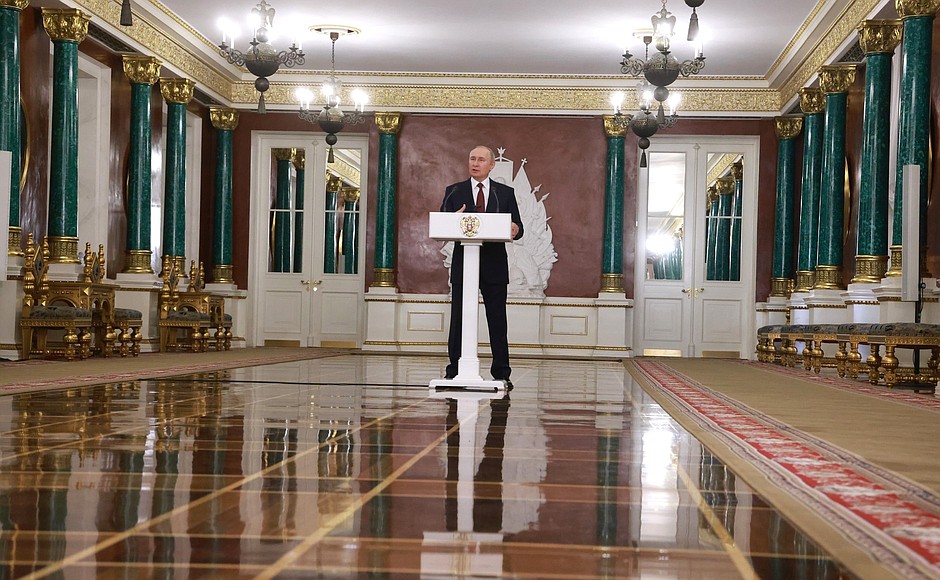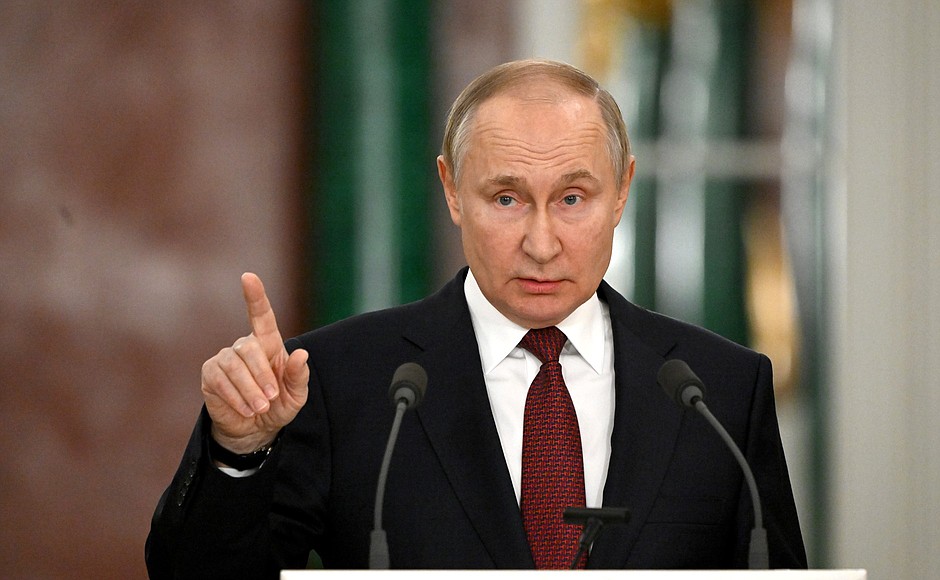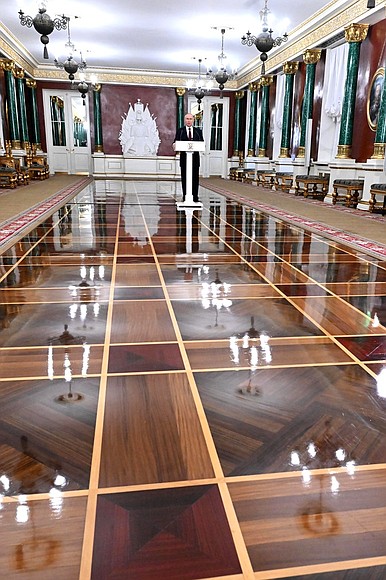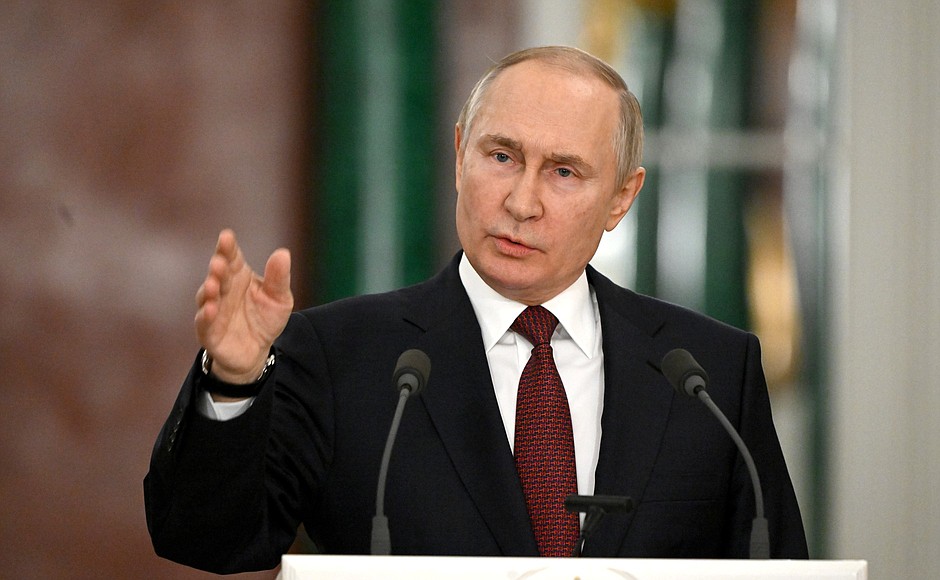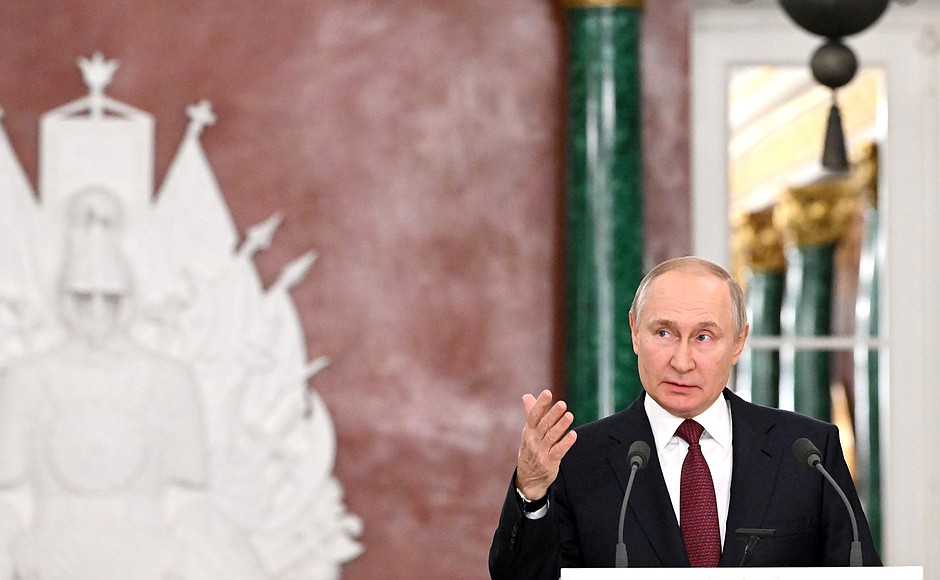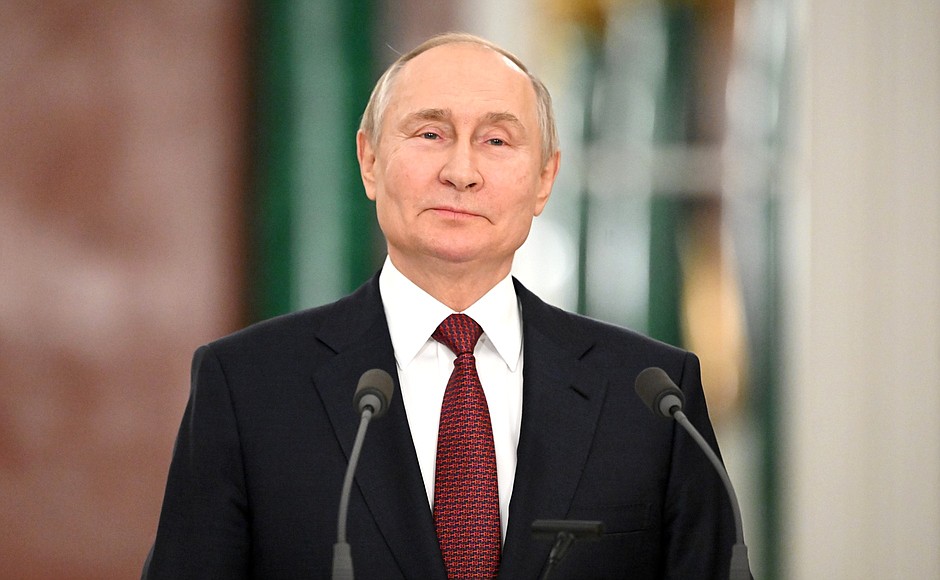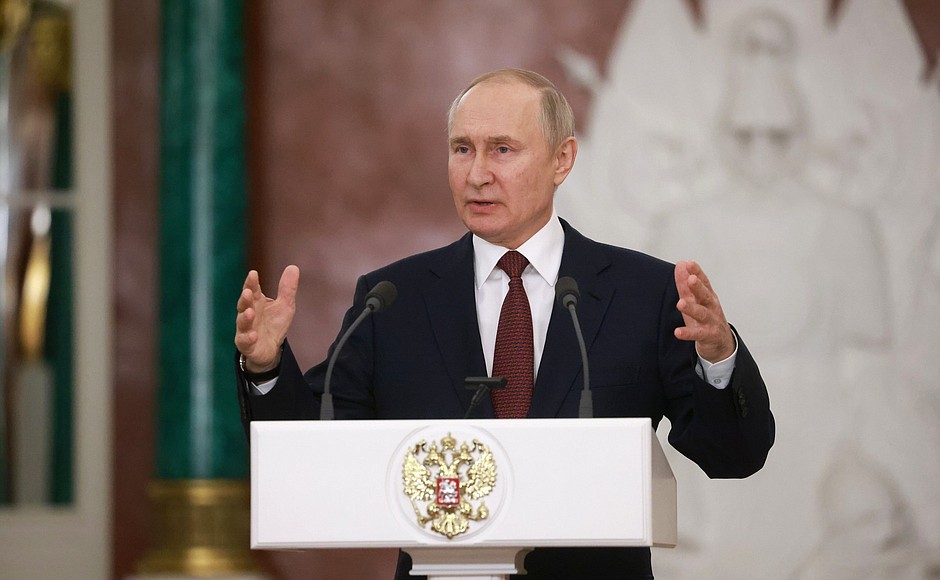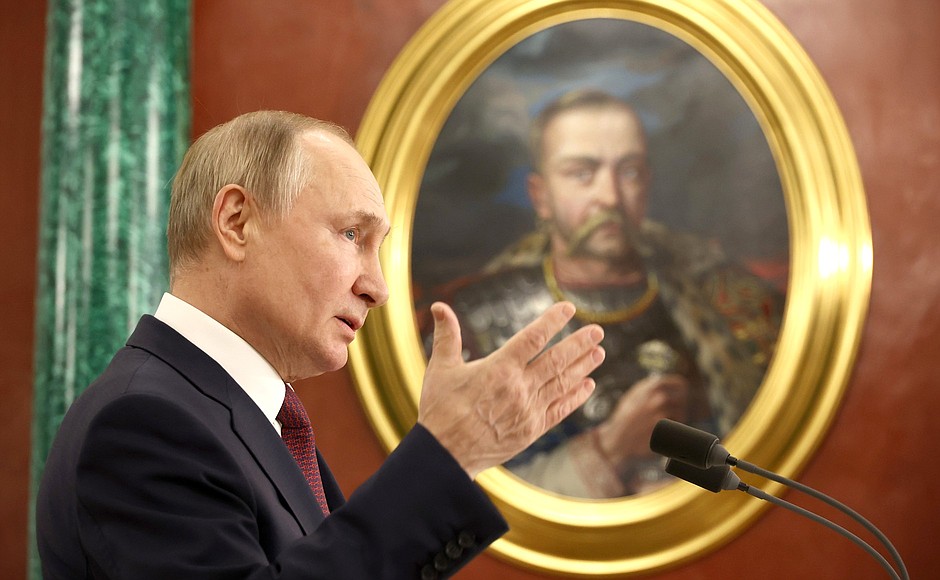President of Russia Vladimir Putin: Please.
Yulia Bubnova: Good afternoon.
TASS Agency, Yulia Bubnova.
To be honest, I would like to start with some summing up. Clearly, it was not the easiest year, and not the most ordinary, but what are its main results for you?
What have we achieved, perhaps, what did we fail to achieve, and how do you see our future, where are we going and where should we arrive?
Thank you.
Vladimir Putin: There are no ideal situations. Ideal situations only happen in plans, on paper, and you always want something more. But in general, I think that Russia made it through the year quite confidently. We have no concerns that the current situation will prevent us from implementing our plans for the future, including for 2023.
Let me repeat once again, we believe – I want to stress this – that everything that is happening, and everything connected with the special military operation, is an absolutely forced and necessary measure. We should be grateful to our military, our troops, officers, our soldiers for what they are doing for Russia, defending its interests, sovereignty and, above all, protecting our people. They act with dignity and achieve what the country needs.
As for the economy, as you know, despite the collapses, devastation and catastrophe predicted for us in the economic sphere, nothing like that is happening. Moreover, Russia is performing much better than many G20 countries, and doing so confidently. This applies to the main macroeconomic indicators and the GDP. Yes, there has been a small drop. I said it quite recently: 2.9 percent, according to our and international experts. Now they are giving another figure, even smaller: 2.5.
The unemployment rate is a key indicator worldwide. In Russia, it is below the pre-pandemic period: let me remind you, then it was 4.7 percent, and now it is at 3.8–3.9 percent. That is, the labour market is stable.
Public finances are stable, there are no alarming details here either. This result did not just fall into our laps. It is the result of the work of the Government, regional teams, businesses, and sentiment in society, which is showing unity and a desire to work together to achieve common goals.
Therefore, in general, we feel confident, and I have no doubt that every goal we set will be achieved.
Konstantin Panyushkin: Good afternoon.
Konstantin Panyushkin, Channel One.
In the wake of the State Council, if you will. How would you personally assess the results of the implementation of youth policy this year, considering the dignified way Russian youth have conducted themselves since February 24?
Vladimir Putin: You know, we always talk about this – well, not us, but look at our classical literature: it is always about fathers and children, it is always a question of young people in any period of the country’s development – and, indeed, I think the same is happening all over the world – young people are constantly accused of being superficial, unworthy of something, that everything was better before.
On the contrary, I believe that young people are always better. Remember the hardest trials at all times in our history. Everyone said, “No, that was then, now they could not do it.” But what can they not do? Young people can do everything. There are different types in all age groups. But in general, our young people show, primarily, a striving for progress, they demonstrate a high level of education, training, understanding of the ongoing processes in the world, in society, and an understanding of where to go, what has true value, what you need to rely on.
I am talking about our history, love for the homeland, for our Fatherland. This is especially pronounced during times of trial.
Recall our difficult events in the North Caucasus. People did not think much of our youth. But recall the paratroopers from Pskov – this is an example of what young people can do, how heroically they can behave. And now look at how young people are fighting and how our youth are responding to what is happening in the zone of the special military operation, how they are supporting our fighters.
I went to the Manezh today, and I was close to tears when I saw how young people in their teens and a little older were collecting things, writing letters. There were also many volunteers that were young as well.
Yes, people are different. There are people who got into their cars and silently drove away, yes. But on the whole, I want to repeat that Russia’s young people – and I can say this with confidence – are demonstrating love for their land, a desire to fight for it and move forward individually and as a country.
Andrei Kolesnikov: Good afternoon.
Kommersant newspaper.
Mr President, you did not give your Address to the Federal Assembly this year and, apparently, there will not be one. Like many others, I have written about this, noting that the issue of the address flared up in several formats recently, for instance, at the meeting of the Council for Strategic Development and National Projects. It seems, yesterday it was also mentioned at the expanded meeting of the Defence Ministry Board.
Could you explain why this is the case this year? And what does the future hold for your address?
Vladimir Putin: I think there was no address in 2017, either. I am referring to the calendar year. But there should be.
What is the problem? The problem is these are fast-moving events, the situation is developing very rapidly. Therefore, it was very difficult – probably not very, but rather difficult to pin down results at a specific moment and specific plans for the near future. We will do that early next year, without a doubt.
But the point of the address lies in what I have just said. It has been reflected in my statements one way or another. It was impossible not to talk about it. So, frankly, it was rather difficult for me and the Executive Office to squeeze this into a formal address without a lot of repetition, and that is it. In other words, I have already spoken about key things in one way or another, so there was not much desire to collect it all again and repeat what I had already said.
For something substantial, we need time and additional analysis of what is happening, what we are talking about and planning for the near future.
We will do this. I will not mention exact dates but we will certainly do this in the coming year.
Kseniya Golovanova: Kseniya Golovanova, Interfax.
Mr President, I would like to ask you about the agreement on supplying Patriot missile battery to Ukraine reached during Mr Zelensky’s visit to the United States. Is it possible to speak about full US involvement in the conflict in Ukraine? What about the consequences of this decision? For instance, can Russia bring its systems closer to the borders of NATO countries or deploy them in direct proximity to the US?
Thank you.
Vladimir Putin: You have asked whether it is possible to speak about greater US involvement in the conflict in Ukraine. I think we need to look at the problem more broadly. What do I mean specifically and why?
Because the United States has been doing this for a long time – it has long been involved in the processes taking place in the Soviet and post-Soviet space. Back in Soviet times whole institutes worked in Ukraine, and they fully realised the background of the issue. They have experienced, deep specialists who know this professionally. I will repeat, the ground was laid during Soviet times; people were selected, meanings were defined and so on. I don’t want to go into details at this point – this is not the right format where one can go deep into the history of the issue. That said, it is still clear where all this came from.
The unity of the Russian world is a very subtle issue. Divide and rule – this slogan was used in ancient times and is still being actively used in real politics. This is why our potential adversary, our opponents have always been dreaming about this and have always been engaged in this. They have been trying to divide us and then run the separate parts.
What is new here? The idea of Ukrainian separatism was born by itself long ago, when we were still one country. You know, I have always said that if someone decides that a separate ethnic group has formed and wants to live independently, for God’s sake, it is impossible to ever go against the will of the people.
But if this is so, this principle must be universal and it is impossible to ever go against the will of people that feel like they are in a different reality, that consider themselves a part of the Russian people and the Russian world, that believe they are part of this culture, part of this language and part of this history and these traditions. Nobody can fight them, either.
But a war was unleashed on them in 2014. I mean a war. This is what it was about. What was it when the centres of million-strong cities were struck from the air? What was it when troops with armour were deployed against them? It was a war, combat operations. We endured all this, endured and endured, in the hope of some peace agreement. Now it turns out that we were simply fooled. So, a country like the United States has been involved in this for a long time. A long time.
In this sense, it is possible to say that by leading us to the current events, they achieved the desired goal. For our part, we had also no other choice than the actions we took late last February. Yes, that was the logic shaping the developments, but our primary goal is to protect people that – let me repeat – feel like they are part of our nation, part of our culture.
What did we believe at one time? We believed that okay, the USSR ceased to exist. But, as I said at yesterday’s Defence Ministry Board meeting, we thought our common historical roots, our cultural and spiritual background would be stronger than what pulls us apart, and such forces have always existed. We assumed that what unites us was stronger. But no, it was not so, due to the assistance of outside forces and the fact that people with extreme nationalist views came to power basically after the collapse of the Union.
And this division was growing worse all the time with the help of these forces and despite all our efforts. As I once said – at first we were pulled apart, separated and then set against each other. In this sense, they have achieved results, of course, and in this sense it has been something of a fiasco for us. We were left with nothing else. Maybe we were deliberately brought to this, to this brink. But we had nowhere to retreat, this is the problem.
They were always fully involved; they did their best. I do not remember now, but you can read up on it in history books. One of the deputies of the tsarist State Duma said, if you want to lose Ukraine, add Galicia to it. And this is what happened in the end; he turned out to be a visionary. Why? Because people from that part behave very aggressively and actually suppress the silent majority in the rest of that territory.
But again, we believed that the underlying foundations of our unity would be stronger than the trends that are tearing us apart. But it turned out this was not the case. They began to suppress Russian culture and the Russian language, tried to break our spiritual unity in totally barbaric ways. And they pretended that no one noticed. Why? Because, as I said, their strategy was to divide and rule.
A unification of the Russian people is undesirable. No one wants it. On the other hand, our disunity would make them happy; they would gladly continue to rip us apart. But our unification and consolidation are things no one wants – except us, and we will do it and we will succeed.
As to the military-technical aspects, the point is that, as I said yesterday, the Admiral Gorshkov frigate will enter combat service in early January, equipped with new weapons systems.
It is not that we are planning any provocations, but it is nevertheless a factor in strengthening our strategic forces. These are medium-range systems, but they have such speed characteristics that they can give us certain advantages in this sense.
As for the Patriot, it is a pretty old system. I would say it doesn’t work like our S-300. Nevertheless, those who oppose us assume that these systems are defensive weapons. All right. We will just keep that in mind, and there is always an antidote. So those who are doing this, are doing it in vain: it just prolongs the conflict, and that’s that.
Konstantin Kokoveshnikov: Good afternoon.
Konstantin Kokoveshnikov, Zvezda TV channel.
If I may, I have one more question about the special military operation. As usual, you have said very little about the course of the operation, preferring not to speak about the details. However, do you see any signs of the conflict becoming drawn out?
Thank you.
Vladimir Putin: You know, I have already spoken about this. The situation actually started developing – this was less perceptible here, while the West preferred not to speak or notice anything – way back in 2014, after the coup d’état that was instigated by the United States, when cookies were handed out on Maidan. I have spoken about this many times.
But our goal is not to whip up the military conflict but to end this war. This is what we want, and this is what we will try to do.
As for me speaking little or sparingly about it, this is logical. On the one hand, I may be sparing words, but the Defence Ministry holds daily briefings to report to the public and the country about what is going on, where this is taking place, in what manner and so on.
In short, we will do our best to end this, and the sooner, the better, of course. As for what and how this is taking place, I have noted on numerous occasions that the intensification of the conflict will lead to unjustified losses. Many a little makes a mickle.
Alexei Petrov: Alexei Petrov, Rossiya TV channel.
Mr President, my question essentially follows up on this theme.
Western political quarters have recently been saying, including in NATO, that the Western resources which are being provided to Ukraine as assistance are not unlimited; in fact, they are running out. At the same time, some Western experts believe that Russia’s resources are down to the last missiles, munitions and so on.
We have heard this before, but, nevertheless, what is the situation in our defence industry? Can it replenish the resources we need, on the one hand, and produce enough for continuing the special military operation, on the other hand?
Thank you.
Vladimir Putin: First of all, I do not think that the resources of Western countries and NATO members have been stretched thin. It is another matter that Ukraine is being supplied with weapons of the former Warsaw Pact countries, the majority of which are Soviet-made. This resource is running out indeed; we have destroyed and burned almost all of these weapons. There is only something like a few dozen armoured vehicles and a hundred of other weapon systems left. We have destroyed a lot of them. The stock of these systems is almost exhausted.
But this does not mean that Western countries and NATO do not have other weapons. They do have them. However, it is not easy to convert to new weapon systems, including NATO-standard ones. This requires preparation time, personnel training, stocks of spare parts, maintenance and repair. It is a big and complicated issue. This is my first point.
Second, there is also the question of the Western defence industry capabilities. The US defence sector is large and can be drummed up, but this will not be easy there either, because this involves additional allocations, and the allocation of funds is part of the budget process. It is not a simple matter.
It is said that the Patriot systems may be sent to Ukraine. Let them do it; we will weed out the Patriots too. And they will have to send something to replace them with or create new systems. It is a long and complicated process. It is not all that simple. We take this into account and count everything that is being sent there, how many systems there are in the depots, how many more they can manufacture and how fast, and if they can train the necessary personnel.
Now to our capabilities and resources. We are spending them, of course. I will not provide figures here, for example, how many shells we are using a day. The figures are high. But the difference between us and those who are fighting us is that the Ukrainian defence industry is rapidly moving towards zero if not a negative figure. All of its manufacturing capabilities will be destroyed soon, whereas our framework is being expanded. As I pointed out at the Defence Ministry Board meeting yesterday, we will not do this to the detriment of the other economic sectors. We must provide for the army anyway, one way or another, as the Minister said yesterday.
Unlike Ukraine, we have been developing our industry, including the defence sector over the past decades. We have been developing out military science and technology. There are some elements lacking, like loitering munitions, drones and the like, but we have been working on that. We know which enterprises can produce them, how many and how soon. We have the funds for financing research and technology centres and manufacturing capacities. We have all of that.
Yes, there is a problem with building up production speed and volumes. But we can do it, and we will certainly do it.
Aisel Gereykhanova: Aisel Gereykhanova, Rossiyskaya Gazeta.
Mr President, in this situation, is there a real chance for a diplomatic solution to the Ukraine situation? Is it possible?
Vladimir Putin: Every conflict, every armed conflict ends with some kind of negotiations on the diplomatic track, one way or another, and we have never refused to negotiate. It is the Ukrainian leadership that has forbidden itself to negotiate. This attitude is somewhat unusual, even bizarre, I would say. Nevertheless, sooner or later, any parties that are in a state of conflict sit down and negotiate. The sooner this realisation comes to those who oppose us, the better. We have never given up on that.
Valery Sanfirov: Valery Sanfirov, Vesti FM.
Mr President, you have been meeting frequently with the military of late.
Vladimir Putin: Does this surprise you?
Valery Sanfirov: No.
Vladimir Putin: Every day, so that you understand, every day.
Valery Sanfirov: A question about heroes.
You have passed Kutuzovsky Prospekt as you were traveling to this State Council meeting; the streets in that area are named after General Dorokhov, Rayevsky, Barclay de Tolly, and Vasilisa Kozhina. Even the State Council meeting took place in a hall with some 11,000 plaques with the names of St George decorated heroes, if I am not mistaken.
Is the special military operation producing national heroes and commanders? Are any new names appearing?
Vladimir Putin: Yes, of course. Unfortunately, any armed conflict is associated with losses, with tragedies, injuries and so on. And as a rule, you know, those who die while defending the interests of their Fatherland, their Motherland, their people, those who receive injuries – they are the strongest. They are at the forefront. And of course, they are heroes. I have said this many times. This is my personal deep conviction.
Just think about it: you and I are standing here in this hall at the Kremlin Palace; we are warm, with the artificial sun shining above us; the lights are on, the interior is beautiful – and the soldiers are out there in the snow. Do you see?
We talk about the insoles in their boots and so on, about their weapons – but they can come under fire at any moment. Of course, they are all heroes. They are putting in a tremendous effort, risking their health and lives. Of course, they are heroes. Some of them commit special acts, acts that are referred to as heroism, personal heroism. Not just hard work, but personal heroism.
We think about this, of course, and we will definitely find a way to present them as role models for our entire society, as an example for the younger generation to follow. These people are strengthening the inner spirit of the nation. This is very important. We certainly have them. There are a lot of them. You probably know some of them; others we do not know yet, we do not have their names yet, but we will list them for sure.
Maria Glebova: Maria Glebova, RIA Novosti.
If I may, I would like to get back to the economy.
You said earlier that the economy has not collapsed. But now we hear that the main blow will come next year. Could you please tell us whether it will be possible to keep the Russian economy afloat?
Also, at the end of each year, you meet with Russian business leaders. But not this year. Why is that? Do you see their role in the growth of private investment now?
I would also like to bring up social matters. Will all social commitments that were made continue to be met?
Thank you.
Vladimir Putin: As for the economy, I have already touched upon this topic, but have something to add.
First, the predicted economic collapse did not happen. True, we have posted a decline, and I will repeat the figures. There have been promises – or predictions or hopes maybe – that Russia’s economy will contract. Some said its GDP would drop by 20 percent or more, by 20–25 percent. True, there is a decline in GDP, but not 20–25 percent; it is in fact 2.5 percent. That is the first thing.
Second. Inflation, as I said, will be a little more than 12 percent this year – it is one of the most important indicators, too. This, I think, is much better than in many other countries, including the G20 countries. Inflation is not good of course, but it being smaller than in other countries is good.
Next year – we have mentioned this, too – we will strive for the 4–5 percent target, based on the economy's performance in the first quarter – at least, we hope so. And this is a very good trend, unlike in some other G20 countries, where inflation is on the rise.
Unemployment is at a historic low of 3.8 percent. We are running a budget deficit, this is true, but it is only 2 percent this year, next year too, then it is projected at one percent, and less than one percent in 2025: we are expecting about 0.8 percent. I would like to point out that other countries – both large developing economies and the so-called developed market economies – are running a much greater deficit. In the United States, I think, it is 5.7 percent, and in China, it is over 7 percent. All major economies are running deficits above 5 percent. We are not.
This is a good foundation for moving confidently into 2023.
Our priority for 2023 will be the development of infrastructure. I do not think I need to list all the projects, we have a lot: the Eastern Operating Domain project, the North-South corridor, and other infrastructure projects across the country (just recently Marat Khusnullin reported on road construction) and so on. Airports, ports, a lot of other projects.
Next, we also need to deal with financial issues. What do I mean? The country’s financial system is stable, banks are reliable and operate without disruptions, which is thanks to the Government and bank employees who work very hard and know their jobs very well. They are highly qualified people who manage many things, if not everything. We must maintain macroeconomic stability. We will not allow any uncontrollable spending but, as I said, will move towards achieving the main macroeconomic indicators that can support the economic stability in general.
I spoke about infrastructure. The next important aspect is maintaining the stability of the financial system, the banking system and the budget. It is important to do a very important thing, which is to substitute the investment that participants in the economic activity relied on before, including some Western institutions, foundations and so on, with sources inside the country. They must be substituted with domestic funding. Of course, we can do it by engaging various instruments. I do not want to go into detail. If you are asking a question about the economy, your readers most likely know what they are. They exist and must be developed. It is not a simple matter but it is possible.
Of course, we must resolve the main issue, which is increasing real wages. It is absolutely obvious. Considering the inflation and the budget revenues, we are able to make a step in this direction. We have an entire set of economic measures we must take. I have no doubt that all of them are achievable. Results of the next year will show how we can fulfil these plans and get closer to solving these tasks.
Maria Glebova: What about large businesses?
Vladimir Putin: Large businesses.
You see, I always enjoy meeting with my colleagues although now COVID is on the rise again, along with swine flu. It is the only problem. I mean I could meet with them like I am meeting with you, but they have to gather in one place. They may pose certain risks to each other in terms of the epidemiological situation. It is the only problem. At any rate, we maintain constant contact and will continue to develop this dialogue.
They are going through difficult times. You see, there are different people. We know that well, the country knows it. First of all, they were all subjected to sanctions. Western, pro-Western or not, they were subjected to the sanctions indiscriminately. What for? To force businesses to confront the government. But people living in this country must serve the country’s interests. And the country is interested in them working effectively and paying taxes. They do not have to have a boat seized abroad or a castle on the Mediterranean Sea or in London.
You see, the point is, if a person lives here and associates their life, the life of their children and family with this country, it is one thing. But if a person does not associate their life with this country and simply takes money from here to build a life abroad, it means they do not value the country where they live and earn money but instead value their good relationships in the place where their property and bank accounts are. This kind of people pose a danger to us.
But we are non-judgmental, as long as they work effectively. We maintain and we will continue to maintain our contacts.
I want to note that maybe not 100 percent, not everyone, but most representatives of business, including large businesses, are patriots of our country, patriots of Russia. Every person has their own individual circumstances, but all of them are striving not to just live and work in Russia, but to work in the interests of our country, maintain their staff, enterprises, develop the economy, etc.
Nakhid Babayev: Good afternoon, Mr President.
My name in Nakhid Babayev, NTV.
I would like to talk more about the economy. Is Russia suffering losses after the price cap on Russian oil was adopted? Has the oil sector asked the state for help, concessions?
Hence the next question. Much is being said about the response measures, and an executive order is being developed. Will the measures outlined by it be able to protect our interests?
Vladimir Putin: You know, I think I will sign the executive order next Monday or Tuesday. These are preventive measures, because there is no obvious damage to Russia, the Russian economy or the Russian fuel and energy sector. We are selling oil at approximately the same prices as this cap.
Yes, the goal of our geopolitical opponents and adversaries is to reduce the income to the Russian budget, but we are not losing anything because of this cap. The Russian fuel and energy sector, the budget and the economy are not incurring losses, because we already sell oil at this price.
But what is important is that they are trying to bring new tools, not characteristic of the market economy, to the global economy. The customer, the buyer is trying to introduce new, non-market regulation to be used in theory and practice in the entire world.
Imagine this: you want to go to a dealer to buy a car, say, a Mercedes or a Chevrolet. You go there and say, “I will buy it for five rubles, no more.” Okay. You buy one, two, three cars, and then the Mercedes factory will close, because the production of Mercedes or Chevrolet cars will not be profitable anymore. It is the same in the energy sector, completely the same thing.
This sector already lacks investment. There are problems related to the fact that money is not invested in new projects such as pipelines, production and development due to environmental concerns and the transition to renewable energy sources. Banks do not loan money, and insurance companies refuse to issue policies. Large global companies have stopped investing in the volume the global energy sector needs.
And now they are trying to administratively set a price cap. This is the road toward destroying the global energy sector. The moment might come when the underinvested sector stops providing the necessary volume of products and the prices will soar and hurt those who are trying to introduce these instruments.
Therefore, energy producers, oil producers in this case, take it personally, referring to themselves, not Russia, but themselves because everyone believes that this is the first attempt to dictate administrative rules of price regulation to producers, and more will follow.
Alexei Lazurenko: Alexei Lazurenko, Izvestia.
I would like to follow up on the same subject.
Similar decisions to cap gas prices were adopted several days ago. What will we do in this context? How big of a threat is this for us, and what will be the future of the Nord Stream pipelines?
Vladimir Putin: This initiative follows the same pattern, as far as I can tell. Once again, we are witnessing an attempt to use administrative leverage to regulate prices. Nothing good can come out of this for gas or oil markets.
Overall, sometimes our colleagues and partners really surprise me by how unprofessional they are. There was a time when it was the European Commission which forced us to switch to market pricing and to setting the price of natural gas on the commodity exchange. We, in turn, and I personally, tried to persuade Brussels not to do it, saying that this is not how the gas market works and would have grave consequences, resulting in surging prices. This is exactly what is happening right now. Now they do not know how to get out of this situation and are trying to regulate the price of gas too.
However, there is a slight difference compared to the way they try regulating oil prices. This time, the European Commission is focusing on regulating commodity exchanges. They are pegging gas prices to LNG, saying that gas prices must correlate with LNG pricing, etc. Still, this is an attempt to use administrative methods for regulating prices.
You know, they do not listen to us, they do not want to deal with us, they do not like us and want to counter us. Fine, but what about listening to themselves? I am referring to those trying to regulate gas prices in Europe. They always take their cues from the Americans, bowing and humiliating themselves every time they are ordered to do something. This time, there were no orders, but they could have listened to what the US experts are saying. Take Friedman, a prominent economist and Nobel Prize winner. He said that if you want to create a shortage of tomatoes, just cap the price of tomatoes. Instantly you'll have a tomato shortage. They are doing the same with oil and gas – exactly the same. For some reason, no one is listening.
We have been keeping a close eye on these developments, watching them. If the system they propose tilts towards administrative regulation and runs counter to Gazprom’s contracts with its counterparts, or if there is any interference in these contracts, we reserve the right to consider whether we have an obligation to perform these contracts while the other party infringes on them.
As for the Nord Streams…. What can I say? This was a terrorist attack, which is obvious, and everyone has recognised this. Even more surprising is that it is an act of international, or should I say state terrorism. Why? Because individuals cannot carry out terror attacks of this kind on their own. States were clearly involved in perpetrating them.
As they say in such cases: look for who will benefit. Who will benefit from Russian gas being supplied to Europe only through Ukraine, who will benefit from Ukraine receiving the money? The aggressor is Russia, but they receive money from us for transit, and we are paying them, though they call us aggressors, and though they are aggressors in relation to Donbass, too. We are countering aggression, not the other way around. They take money and that is alright. Money is money.
Who benefits from Russian gas being supplied to Europe only through Ukraine? That is who blew it up. Nobody is investigating. We had an opportunity just once to inspect the sites of explosions. All this was in the media, there is nothing to repeat, as I am sure you already know this. But there is no real investigation, no one is investigating. It is astonishing but true.
As for oil and gas, do you know what occurred to me right now during our conversation? I have already talked about this once, but I think it will be difficult to disagree with what I am about to say.
Look, they are trying to put a price cap on energy resources, on oil and gas. Who produces them? Russia, Arab countries, Latin America, Asia, Indonesia, Qatar, Saudi Arabia, the UAE produce oil, too. The United States produces both oil and gas, but they consume everything: they have little left for the external market. That is, it is produced in those countries, but consumed in Europe and in the United States.
I believe that what they are trying to do now is a remnant of colonialism. They are used to robbing other countries. Indeed, to a large extent, the rise of European countries’ economies is based on slave trade and robbery of Africa, Asia, and Latin America. To a large extent, the prosperity of the United States grew out of the slave trade and the use of slave labour, and then, of course, as a result of the First and Second World Wars, which is obvious. But they are used to robbing others. And an attempt at non-market regulation in the sphere of the economy is the same colonial robbery, or, in any case, an attempt at colonial robbery.
But the world has changed and they are unlikely to be able to do it today.
Alexander Yunashev: Mr President, good afternoon.
Alexander Yunashev, Life.
I would like to ask you how the events of recent months have changed your life and daily routine? Do you find the time to exercise?
Next week is New Year, so I would like to wish you happy holidays and ask how you will spend them?
Thank you.
Vladimir Putin: Thank you.
There is nothing out of the ordinary here. I will celebrate this New Year with my family, with people who are dear to me, and I will watch the President's speech, the address.
As for sports, I do continue to exercise. I believe that this is just a way to stay in shape, and I must stay fit for work. It is like a pill that makes you feel good and work well. I wish everyone had this attitude to sports: it is a good thing. They say that it also helps stay fit mentally: a sound mind in a sound body.
Thank you, too.
Have wonderful holidays! My best wishes.
